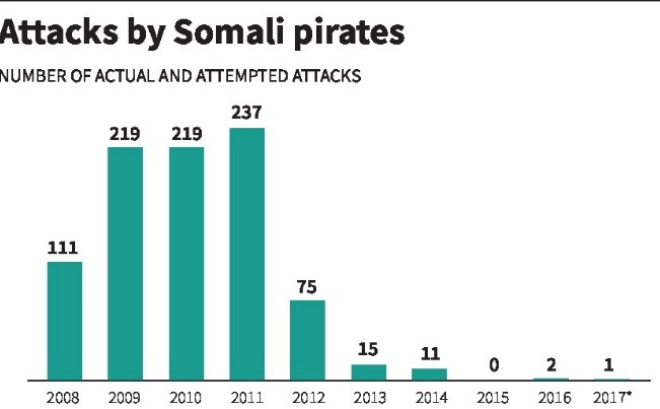Somali pirates are under investigation for supporting ISIS, report says
 Somali pirates are under investigation for supporting ISIS, report says
Somali pirates are under investigation for supporting ISIS, report says
Somali pirates already threaten ships heading past their country’s coast with hijacking. Now, international authorities are investigating them for posing a new kind of danger: aiding terror groups.
The United States and United Nations are looking into at least two pirate kingpins for helping Somali terror groups smuggle arms and people, according to a report from CNN.
The pirate leaders are accused of supporting two rival terror groups, al-Shabaab, an al Qaeda-linked group of Islamist militants at war with the UN-backed Somali government, and Somalia’s ISIS-affiliate, according to three unnamed U.S. and UN sources.
Mohamed Garfanje, one of the kingpins reportedly being investigated, heads the powerful Hobyo-Haradhere Piracy Network and is one of the main suspects in the 2012 kidnapping of German-American journalist Michael Scott Moore.
Garfanje’s group has also reportedly paid al Shabaab a cut from its ransom payouts in the past.
The other unnamed kingpin is reportedly accused of aiding Somalia’s ISIS wing with logistics, arms smuggling, and human trafficking.
The alleged investigation comes alongside a recent spike in Somali piracy after years of relative calm. Last year, zero successful hijackings happened in the region, according to the latest report from maritime watchdog Oceans Beyond Piracy, but 2017 has already seen as many as six attacks near Somalia, including the first large-scale hijacking of a major merchant ship, the Aris 13 oil tanker, since 2012.

In the early 2010s, a spate of near-daily reports of hijackings off the Horn of Africa — a sea corridor that handles nearly $700 billion dollars a year of cargo — forced the U.S., European Union, Russia, India, and Japan to step up security efforts around piracy. As a result, piracy dropped dramatically in the region, with 17 pirate attacks near Somalia in 2015, down from 151 in 2011, the Washington Post reported.
But overall spending on the issue also declined from $7 billion in 2010 to just $1.7 billion in 2016, according to the Oceans Beyond Piracy report. And NATO ended its anti-piracy mission in the area in December 2016. Combined with Somalia’s ongoing humanitarian and political crises, the oversight vacuum in the region left the underlying factors that motivate piracy relatively unchanged.
Speaking at an April 2017 press conference in Djibouti, Defense Secretary James Mattis said the Pentagon was monitoring the situation but didn’t see a “big role” for the U.S. at the moment in addressing the recent spike.

Comments are closed